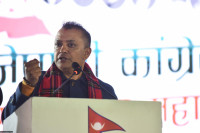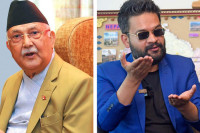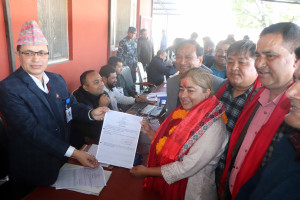Opinion
Middle class mirage
Many in Kathmandu were not aware of the events in the Madhes until the blockade hit them
Bicram Rijal
Right after the promulgation of the new constitution, India imposed an ‘unofficial’ economic blockade on Nepal which continues till date. The blockade has resulted in shortages of fuel and daily commodities, and severely disrupted the movement of people. Almost all the petrol pumps have shut down; and whenever one opens temporarily, a line of vehicles that is kilometres in length quickly forms in front of it. Even the roofs of public vehicles are occupied by passengers making travel hazardous. The bustling capital city of Kathmandu looks slow and dull. The shutters of many shops have been pulled down. Interestingly, as life is getting more and more difficult and strains in Nepal-India relations are becoming more pronounced, debates over nationalism have taken centre stage. Social media commentaries have been bringing the dichotomies between nationalist and anti-nationalist elements to the fore.
Relationship with the state
What is striking to me, as a social scientist, is how different people are imagining the Nepali state to be and the way they are relating to it. One thing for sure is that there is no single way of belonging to the Nepali state. In this context, the imagined communities, to borrow Benedict Anderson’s phrase, are diverse. There is no common and universal principle that dictates state-citizen relationship. The Madhesis and Tharus, in particular, have expressed dissatisfaction against what they call discriminatory provisions in the constitution and they feel excluded, marginalised and cheated by their own state. Their relationship with the Nepali state, at present, looks more oppositional.
Fearing that the ongoing crisis in the Tarai along with ethnic and regional politics could weaken the pedestal of nationalism, many—mainly privileged social groups—believe that national identity should precede ethnic or regional identity. Their imagining of the nation as being something beyond who they are (in terms of caste, ethnicity, gender and class) becomes an implicit means to maintain the status quo. Perhaps their fear may be not about the loss of the nation per se, but about the loss of their privileges—power, prestige and authority included—which they have exercised for a long time. For those who advocate Nepal and Nepali first (as if those who fight for their rights are not authentic Nepalis), the Nepali state is what they see themselves through. In this sense, their belongingness to the state looks more relational.
Class and nationalism
The current unofficial economic embargo by India and the political turmoil in the Tarai challenge the political establishment of Nepal—represented mainly, at present, by Nepali Congress, CPN-UML and UCPN (Maoist)—as much as it opposes the middle class ideology and practices. According to Pierre Bourdieu, class identity consists not only of access to, or lack of, different kinds of capital, economic, social, cultural, and symbolic, it also involves established ways of being, which he calls “habitus”. Most of us who have houses and resources to live in Kathmandu were not aware of what was going on in Madhes until the undeclared economic blockade started affecting our everyday lives. We realised that things were bad only when we saw very few vehicles on the streets and long queues outside petrol pumps, acute shortages of cooking gas heightened our worries and uncertainties, schools closed and the burden of looking after the kids fell on us, and our planned vacation trips to Nagarkot or Pokhara were cancelled.
We have rarely paid heed to how the poor in Kathmandu have been coping with this harsh situation, what life is like for daily wage labourers at construction sites in Banke, and how those whose family members were killed during the protests are currently feeling. These things are not on our priority list because they do not match our class existence. In fact, we have other things, upon which our class gives greater significance, to think about: provocative and divisive statements by Nepali politicians and journalists on the Tarai agitation and the Indian embargo, whether X or Y will become the next minister, and whether our holiday plans will be fulfilled.
Our middle class ‘habitus’ does not allow us to be conscious about the plight and suffering of the impoverished, marginalised and historically excluded masses.
As our ways of being are different from theirs, we never realise that the structural violence—a concept coined by Johan Galtung and elaborated on by anthropologist Paul Farmer that refers to institutional and structural constitution of suffering and harm—they suffer is far greater than what we do. As long as we remain within the comforts of our middle-class ideologies and practices, abstract discourses on nation and nationalism will continue get primacy over serious discussions on entrenched and systematic forms of deprivation, impoverishment, discrimination and inequality. We only see what our class disposition allows us to see. And, our historically formed habitus blinds us to the things that others see and do.
Beyond parochialism
The major political parties have been looking for alternatives to fight the current embargo, like importing petroleum products from China, and redefining our unequal trade and diplomatic relationship with India. Further, there have been calls to resist Indian ‘intervention’ and ‘expansion’. But the parties have not seriously thought about remaking Nepali society, polity, bureaucracy, and even the Nepali state. This is because, as soon as they become serious about restructuring Nepali society by eliminating entrenched social practices of discrimination and exclusion—by innovating and diversifying our economy, and by cleaning up the decades-long political mess—they step outside parochial boundaries of class, caste, region, religion and political ideology.
Contemplating this reality could give help us perceive nation and nationalism in different light. Our debate on nationalism should not be limited to how Nepal and India relate to each other. Rather, they should also be about how the different groups in Nepal relate to their own country. Only by unravelling the broader contexts (national and international) and micro experiences of nationalism will the discussion be fruitful.
Rijal is a PhD candidate in Anthropology at Simon Fraser University, Canada




 14.12°C Kathmandu
14.12°C Kathmandu










